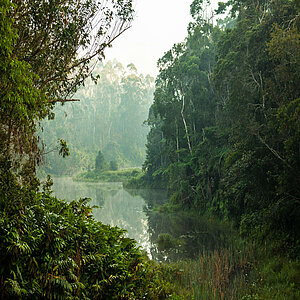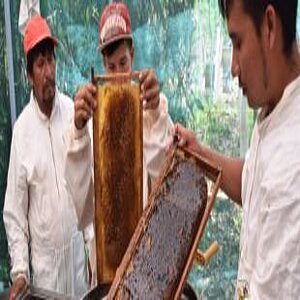Chocolate key in preserving Guatemalan rainforest
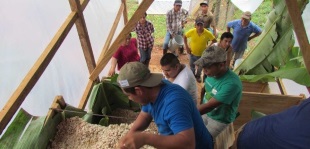
Rainforest conservation and promoting sustainable value chains in cocoa production: these are the goals of this IKI project in Guatemala. Michael Metz from OroVerde reports on the first cocoa harvest of the year.
Rainforest conservation and promoting sustainable value chains in cocoa production: these are the goals of the International Climate Initiative (IKI) project “Development of business models for cooperation with the private sector as a tool for socially acceptable restoration of near-natural forests” in Guatemala. There, the OroVerde tropical rainforest foundation supports small farmers in forming cocoa cooperatives as an alternative to traditional growing of maize. Not only does this help the farmers – it also ensures sustainable use of land and soil. In addition to forest regeneration activities in three separate protected areas, establishing and developing various value chains – such as in cocoa production – is a focal part of the project. Michael Metz from OroVerde reports on the first cocoa harvest of the year.
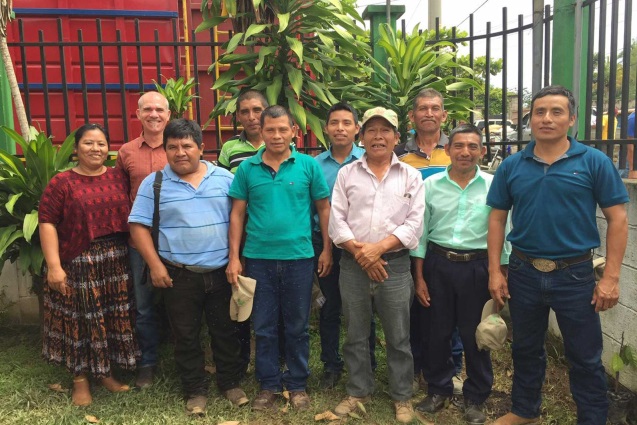
Carrying heavy sacks on their shoulders, the cocoa farmers of Sierra de las Minas bring their first cocoa bean harvest of the season to the agreed collection point. At first the group is small, but word soon spreads throughout the village and more and more farmers start to arrive. Under the farmers’ watchful eyes – and with numerous villagers looking on – the sacks are opened one by one and the cocoa bean quality is assessed. The beans need to be picked fresh at just the right time and they must not contain any impurities. If the beans are declared acceptable, the sacks are hung on market scales and weighed. A worker notes the weight next to the farmer’s name. Using a pocket calculator, the weight is multiplied by the agreed price and the resulting amount is paid out then and there to the farmer in cash.
What’s special about today is that for the very first time, the farmers have handed over the cocoa bean yields from their biodiverse, agroforestry systems to their own recently-formed cooperative – and not, as is usually the case, to middlemen (known as ‘coyotes’) who come into the villages to buy up freshly-picked cocoa beans. The creation of a rotating micro-fund for small farmers’ cooperatives under the OroVerde ForestValues project is extremely important in bridging the gap between harvesting, processing and selling the cocoa beans. It also enables farmers to engage in other kinds of investment in the value chain.
This step was of key importance for the farmers involved because they are heavily reliant on revenue from the sale of their cocoa beans to buy medicines, purchase school materials for their children and afford the other things they need in daily life. Many small farmer families live almost exclusively from what they grow on their plots. Others forms of income are few and far between. Once they have picked their cocoa beans, farmers cannot afford to wait weeks or even months until the cooperative has processed them and sold them on.

And this is exactly the point where farmers have a great opportunity to obtain a much better price for their cocoa beans: cooperative processing produces high-quality cocoa mass and its sale via the cooperative gives farmers a stronger bargaining position when dealing with buyers.
At the end of the first, two-day collection phase, a total of 121 farmers from 11 communities have handed over 1,880 kilos of freshly-picked cocoa beans. Two additional collection days result in a combined yield of more than 7,500 kilos from some 200 farmers in total. The cocoa fermentation and drying equipment is working full out, and all involved are bursting with enthusiasm and pride. The cooperative is finally up and running.
The task now at hand is to negotiate the best price they can get. And interested buyers are waiting. From the revenue received, further harvest-related purchases can be made before the money that was borrowed flows back into the fund. The profit remains with the cooperative. As its members, the farmers decide for themselves how much of it they will receive (based on the weight of the beans they handed in) and how much should be saved as a reserve so the cooperative can fund future expenses and investments.
The link between cocoa crops and rainforest conservation in Guatemala
For many years, OroVerde has promoted the cultivation of fine cocoa in near-natural agroforestry systems beneath shade trees as a sustainable alternative to traditional maize farming in the communities covered by the project. This is because yields from maize crops are rapidly declining, soil fertility is poor and farmers are being forced to clear rainforest so they can cultivate new areas of land. By way of contrast, agroforestry systems enable sustainable land use with a variety of crops that not only improve food security for families, but also open up new income opportunities from existing cocoa crops. Supplemented by native shade (tropical timber) trees, the plantations provide an additional long-term income opportunity to fund larger purchases and investments – and new habitats for numerous flora and fauna from the protected area nearby.
In its ForestValues project, OroVerde collaborates with its partners Defensores de la Natureleza and Heifer International Guatemala in three separate protected areas in Guatemala.
The project is part of the International Climate Initiative (IKI). The Federal Ministry for the Environment, Nature Conservation and Nuclear Safety (BMU) supports the IKI in accordance with a German parliament (Bundestag) decision.
The link has been copied to the clipboard
Contact
IKI Office
Zukunft – Umwelt – Gesellschaft (ZUG) gGmbH
Stresemannstraße 69-71
10963 Berlin




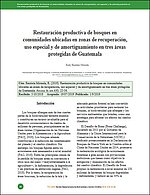
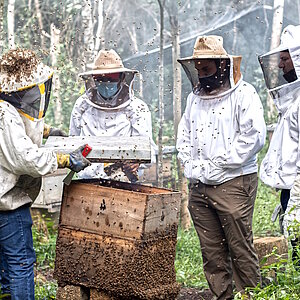
![[Translate to English:]](/fileadmin/_processed_/0/1/csm_20230712_AdobeStock_604924276_Baum_Hand_0d56a1fbb6.jpeg)

